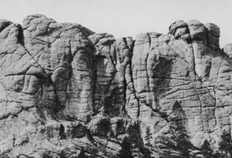weekly column
|
Each week, find a commentary on something connected to verses of Torah or another source of wisdom
|
|
Each week, find a commentary on something connected to verses of Torah or another source of wisdom
|
 The Last of Deuteronomy Meanwhile, we stayed on in the valley near Beth-Peor Deuteronomy 3:29 There is not a lot of traveling to distant destinations during the days of the pandemic. I never had quite the wanderlust of others in my family, but I am discovering that knowing I can’t vacation elsewhere makes me desire it more. Therefore, I am taking delight in the way some of my Facebook friends are passing the time by posting photographs of the places they have visited. Some of the pictures are just tourist shots, easily identifiable. Others are framed or cropped in such a way that they are more mysterious. The one consistency among them is that they represent happy memories. So far, no one has posted “quaint little café in rural village where I got food poisoning” or “back of pickpocket running away after stealing my wallet.” I have wonderful shots of the Judean desert, the Danube and Buckingham Palace, but none of Kharkov in Soviet days, where happiness seemed in short supply generally. I am sure that there are people whose recollections of all those places and more are different than mine. Someone fell and broke a bone in the desert, dropped a camera into the river and got drenched in a downpour in London. And I am certain that sometime, someone had a romantic encounter in Kharkov. They should live and be well. Personal associations are not the only ones prompted by geographic locations. Places like Kilimanjaro, Seville and Wrigley Field carry with them cultural references shared by people who have never visited (Hemingway, Barber of, best ballpark in America). And sometimes, the references are lost due to time or changing circumstances. Mt. Megiddo (in Hebrew “Har Megiddo”) was home to 27 different cities before it became synonymous with a prophesied cataclysmic battle (Armageddon). So when Moses reminds the Israelites that they “stayed in the valley near Beth-Peor,” the modern reader of the Bible – especially the casual reader of the Bible – probably shrugs and moves on to the next chapter. But Beth-Peor resonated with the assembled Israelites in a different way and carried that resonance deep into the Jewish imagination through the rest of the Bible and into later times. Beth-Peor (“House of Peor”) was the home of the Moabites, and their god was the infamous Baal. From the Bible’s perspective, the Moabites were licentious, dedicated to unspeakable acts of abuse performed as worship. In fact, the Talmud and its commentators are explicit that Moabite religion included the exposure and penetration of various intimate orifices in the name of Baal. Camping out in the valley near Beth-Peor was a fraught activity, saturated with both fear and titillation as Moses and the leadership tried to maintain a separation from the locals. It reminds me of visiting Israel in 1970 and meeting my local teenage peers who responded to the information that I came from Chicago with, “Al Capone! Ack-ack-ack-ack-ack!” And no, I explained, my father was not a gangster. There are places in the United States known in their current circumstances very differently than the events and contexts of their previous history. Tulsa, Selma, and Ocala resonate with a history much larger than acknowledged today. Seattle and Silicon Valley have reputations that were unimaginable 50 years ago. And though natural beauty exists independent of human labels, Yellowstone, Yosemite, and Petrified Forest are lifted up by their designation as national parks thanks to the imagination of President Teddy Roosevelt and those who followed. We are blessed to live in a time when so many media are available to take us on journeys we might otherwise never experience. Though each has its limitations, collectively they enhance each other to give a fuller picture of what it means to be in a distant and unfamiliar place. But we shouldn’t lose sight of the stories that have meaning to individual travelers, to history and to the experiences of those from a different time than ours. They should inspire us to want to visit, even in our imaginations, and to do so not only across physical distance, but through the many layers of memory that are preserved in time.
2 Comments
 ROOM FOR ONE MORE The Last of Deuteronomy But you did not encroach upon the land of the Ammonites, all along the wadi Jabbok and the towns of the hill country, just as the Lord our God had commanded. Deuteronomy 2:37 Some of you will stop reading after the next sentence. The only thing that continues to astonish me about Donald Trump is that there are still things left that astonish me about Donald Trump. On the eve of the Fourth of July, he did the most touristy thing a person can do – he took a photo in front of Mount Rushmore that made it look like his face was among the presidents carved into that mountain. As the old saying goes among those who study the presidency, every one of them secretly thinks there is room for one more. The expected thing to say at this moment is that two of those presidents were enslavers and that all of them were privileged in multiple ways. Also, the sculpture is an accomplishment that was achieved at the expense of the people native to that land who have, understandably, little affection for most, if not all of the four, and even less for the sculptor who defaced their mountain. Maybe I will debate another time what mitigation that should have on their accomplishments. But the point is, they had accomplishments. Washington established us as a nation. Jefferson crafted our vision. Lincoln prevented us from crumbling. Roosevelt elevated our obligation to preserve the natural world. There are probably other presidents whose likenesses might have been a part of that frieze. I don’t think anyone would nominate Franklin Pierce or Andrew Johnson, but others of our flawed leaders contributed to the advancement of the nation in its imperfect quest for liberty and justice for all. The Black Hills of South Dakota have been the uninterrupted home to native tribes and nations since long before the United States was a glint of an idea. Rushmore itself was known as the hill of the six grandfathers, a natural formation more obvious (in photos, at least) than the characters of the constellations. As magnificent as the artistic accomplishment is, as principled as the statement is meant to be, it is an encroachment on the land of the Lakota Sioux. But before that? And before that? Declaring squatters’ rights on (presumed) unoccupied land seems to be a decidedly random standard that rewards longevity and inhibits free migration. There is no argument that can be made about inherent rights to land that does not appeal to a higher authority. For the Israelites, it was God. For the Sioux, it is the Great Spirit. For the United States, it is the law. When there are competing higher authorities, the result is most often war. Most wars are fought with heavy arms and loss of life. Sometimes, wars are fought with ideas. And while it is not the case that mightier ideas are better ideas, when there is a victor, the test of that victory is the integrity of those ideas and whether they accommodate the losers. For reasons we cannot know, the Israelites were instructed by their higher authority to respect the territorial integrity of Ammon (the capital city of which is today Amman, Jordan). It was not out of affection or alliance, and it was distinct from the confrontations with Ammon’s neighbors. The Ammonites themselves were both conquerors and vanquished among the regional tribes that claimed the land, and the instruction to avoid “encroachment” may have been out of respect or caution. But what is important is that the Israelites did not put their personal passions above their collective values. The tribe of Ammon is long gone. Were they to show up today, I doubt that the Hashemite Kingdom of Jordan would cede their land back to them. But they would be justified in expecting to be accommodated, not dismissed or disparaged, and certainly not mocked. There is no more room on Rushmore. But if there were, it would not be set aside for a man with no discernible accomplishments who cannot accommodate his opponents, dismisses the higher authority of the law and mocks those who preceded him. Maybe I shouldn’t be astonished. But I am.  The Last of Deuteronomy Thus, after you had remained at Kadesh all that long time, Deuteronomy 1:46 I think it is hard to anticipate memory. Unless something profound or traumatizing (or both) occurs, we are hard-pressed to identify what we will remember after a long time has passed. Last week, my granddaughter called us to tell us that she learned how to ride her bicycle without training wheels. She was extremely excited (even supplanting the first loose tooth of the preceding week). She gave us a step-by-step description of how it happened, including that mysterious moment when uncertainty switched to confidence. Suddenly, I had a clear recollection of the day I learned to ride my two-wheeler. I had spent the better part of the day trying to balance, believing I was making progress. My father arrived home from work and told me it was time to come into the apartment, and I asked if he’d watch what I could do. Just like that, I took off down the street and rode the whole block, turned around, and rode all the way back. And when I came inside, what did I do? I excitedly called my grandparents with a step-by-step description. All that long time – all but a few years of my life – I did not think about that specific episode. Reminded of it when I wound up on the other end of a very different telephone, the memory was clear as a bell. This wasn’t déjà vu. This was history repeating itself, on a very small scale. As I write this column, I have been more or less quarantined for almost four months. Except for one very exciting and somewhat illicit day trip to see our grandkids before they started day camp (and therefore became higher risks to old people like me), the scenery around me has not changed during all that time. I am pretty clear when it is Monday, but after that, I generally have to check my phone to remember the day of the week. Many things have happened, but I am hard-pressed to tell you when. Four months is not such a long time, certainly not compared to 63 years. And four months is, likewise, not much compared to the thirty-eight years that the liberated Israelites spent wandering the wilderness. We know nothing of those years – from the paralyzing anxiety of the generation that would not enter the Promised Land to the long farewell address that Moses delivers as a new generation prepares to do so. During that time, there were periods of excruciating sameness. The camp was set, the Tabernacle was raised, the manna fell. Even the agitation of sin, so defining in that first year of migration, didn’t merit a mention in the Bible. I wonder if the adults who had gathered to hear Moses were transported to their childhoods by his recollections. In his long valedictory he will remind them of every place they camped. He will recall somewhat inconsistently the revelation at Sinai. Eventually, he will summon the names and attributes of the great-great-great-(etc.)-grandfathers who gave the tribes their names. Eventually, he will challenge them to choose life contrary to the choices of their parents. All that long time at Kadesh was the beginning of an historical void for the people, but not for the persons. There were no bicycles, but teeth wiggled, and friendships formed, and love blossomed, and families grieved. Except for shabbat, every day was like every other, a vista in time that paralleled the panorama of the wilderness, challenging the former slaves to fill their own hours the way others had once filled those hours for them. Somehow the incidental occurrences we take for granted will settle into memory, ready to be recalled. Things happening around us in this unfamiliar terrain are bound to be repeated when the landscape is familiar again, maybe by a giggly five-year-old or by an old guy like me who feels compelled to remind you how things use to be all that long time ago. |
Archives
October 2023
Categories |